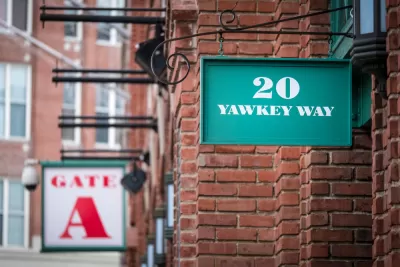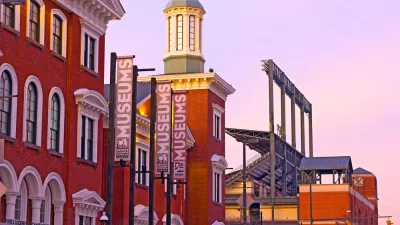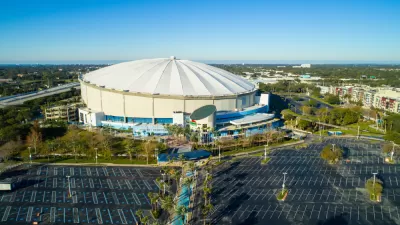The Midsummer Classic is over, and the dog days of summer are looming. Not every team has a chance at October baseball, but some still offer a lot to love in the neighborhood outside the ballpark.

Anyone who has trekked across parking lots to get to parking lots in Los Angeles, Anaheim, or Oakland knows that not all ballparks were designed to integrate into the neighborhood. Go to the North Side of Chicago or Yawkey Way in Boston and you'll see the benefits of ballpark planning before car-centric planning was a thing.
A Chicago Tribune team has created an unscientific ranking of the neighborhoods outside the ballparks of the 30 teams in Major League Baseball, with somewhat predictable results at the top: Fenway Park in Boston at number one and Wrigley Field in Chicago at number two. Petco Park in San Diego might surprise some at number three. Most likely to be controversial, however, is the new suburban ballpark for the Atlanta Braves, SunTrust Park in Cobb County, which comes in at number four.
FULL STORY: Ranking all 30 MLB ballpark neighborhoods

Maui's Vacation Rental Debate Turns Ugly
Verbal attacks, misinformation campaigns and fistfights plague a high-stakes debate to convert thousands of vacation rentals into long-term housing.

Planetizen Federal Action Tracker
A weekly monitor of how Trump’s orders and actions are impacting planners and planning in America.

In Urban Planning, AI Prompting Could be the New Design Thinking
Creativity has long been key to great urban design. What if we see AI as our new creative partner?

Florida Seniors Face Rising Homelessness Risk
High housing costs are pushing more seniors, many of them on a fixed income, into homelessness.

Massachusetts Budget Helps Close MBTA Budget Gap
The budget signed by Gov. Maura Healey includes $470 million in MBTA funding for the next fiscal year.

Milwaukee Launches Vision Zero Plan
Seven years after the city signed its Complete Streets Policy, the city is doubling down on its efforts to eliminate traffic deaths.
Urban Design for Planners 1: Software Tools
This six-course series explores essential urban design concepts using open source software and equips planners with the tools they need to participate fully in the urban design process.
Planning for Universal Design
Learn the tools for implementing Universal Design in planning regulations.
Gallatin County Department of Planning & Community Development
Heyer Gruel & Associates PA
JM Goldson LLC
City of Camden Redevelopment Agency
City of Astoria
Transportation Research & Education Center (TREC) at Portland State University
Jefferson Parish Government
Camden Redevelopment Agency
City of Claremont





























